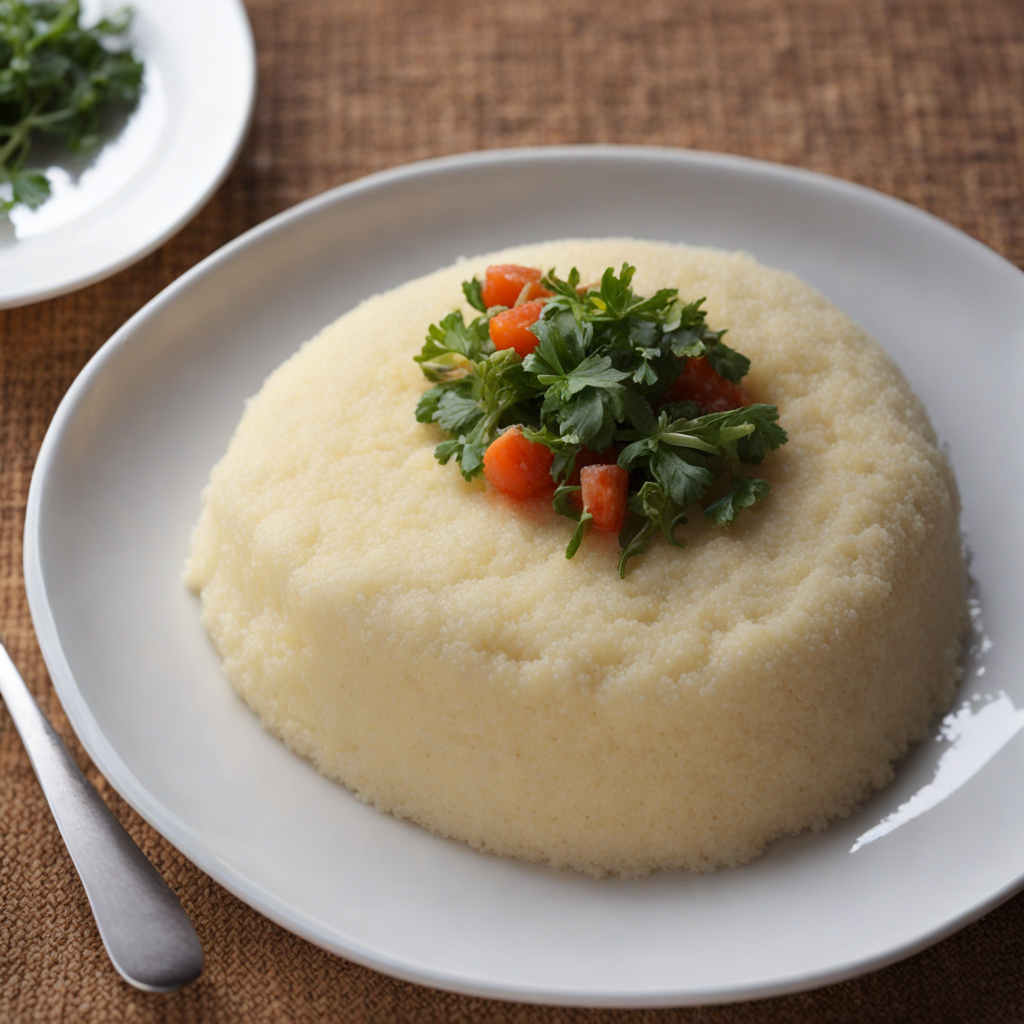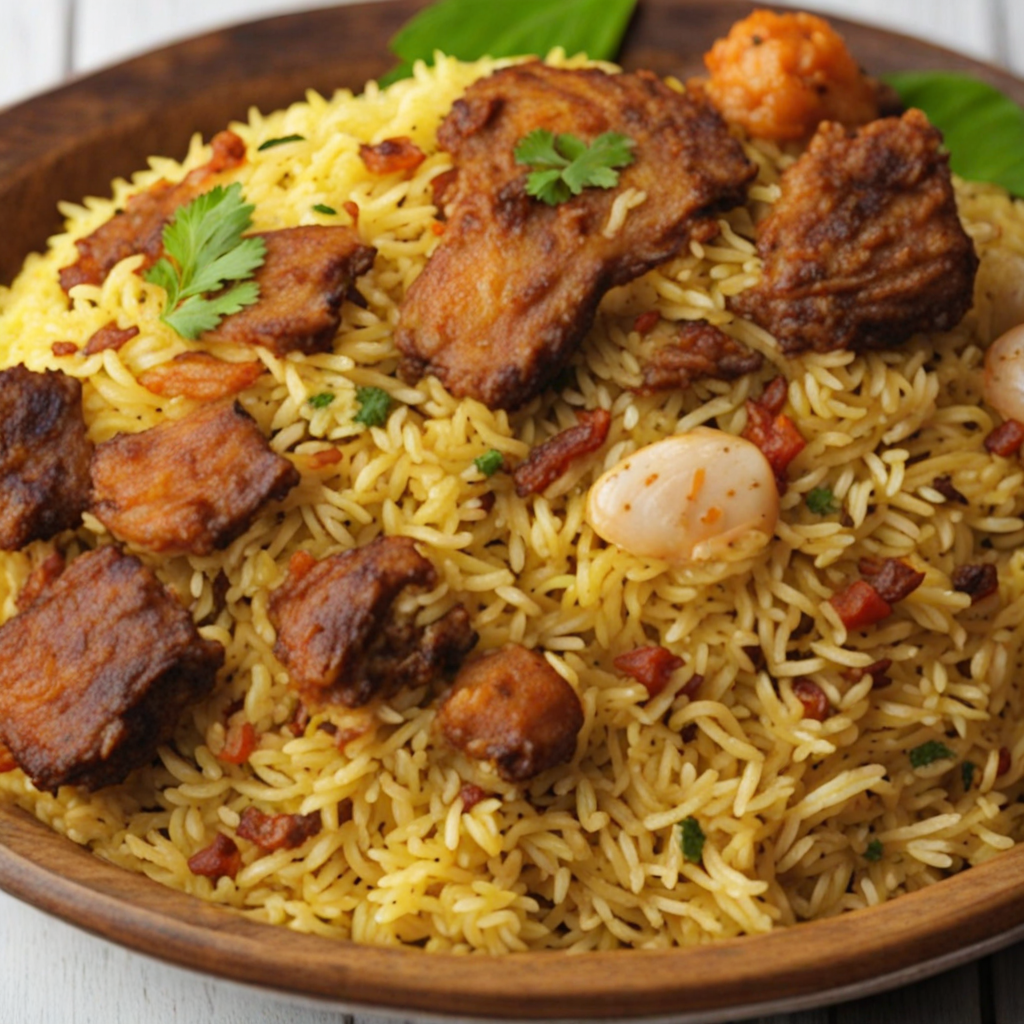Ugali
Ugali is a staple food in Tanzania, crafted from maize flour (cornmeal) and water, resulting in a dense and dough-like consistency. The preparation involves boiling water and gradually adding the maize flour while stirring continuously until it thickens and pulls away from the sides of the pot. This simple yet labor-intensive process yields a versatile dish that serves as a foundation for many meals. The texture is firm, allowing it to be molded into a round shape, making it easy to scoop up accompanying dishes, such as stews or vegetables, with your hands. In Tanzania, ugali is often enjoyed with a variety of flavorful accompaniments, such as grilled meats, fish, or rich vegetable stews. The dish is known for its neutral taste, which allows it to absorb the flavors of the sauces and spices it is paired with. This makes ugali an excellent canvas for showcasing the vibrant culinary traditions of Tanzania, where local ingredients and spices play a significant role in enhancing the overall tasting experience. The communal aspect of sharing ugali also adds to its appeal, as it is typically served in a central dish for everyone to enjoy together. For those eager to explore new flavors, ugali presents an opportunity to experience Tanzanian culture and hospitality. This dish is not just food; it is a symbol of togetherness and sustenance for many Tanzanians. Whether you enjoy it with spicy fish curry, sautéed greens, or even a rich tomato sauce, ugali's unique texture and adaptability make it a delightful introduction to the rich and diverse world of East African cuisine.
How It Became This Dish
The History of Ugali: A Culinary Staple of Tanzania #### Origins and Early Development Ugali, a staple food in Tanzania and several other East African countries, is a dense porridge made primarily from maize flour (cornmeal) or cassava flour. Its roots can be traced back to the early agricultural societies of East Africa, where the cultivation of grains and tubers played a crucial role in sustaining communities. Although it is most commonly associated with Tanzania, ugali has variations throughout the region, including sadza in Zimbabwe, nshima in Zambia, and posho in Uganda, each reflecting local agricultural practices and cultural preferences. The exact origins of ugali are difficult to pinpoint, as the preparation of ground grains into a cohesive form likely developed independently in various cultures around the world. Archaeological evidence suggests that maize was introduced to East Africa from the Americas in the 16th century. As maize became a staple crop, communities began to experiment with it, leading to the creation of ugali. Despite its humble ingredients, ugali embodies the essence of Tanzanian cuisine. Traditionally, it is made by boiling water and gradually adding maize flour, stirring continuously until it reaches a thick, dough-like consistency. The process is simple yet requires skill to achieve the perfect texture—smooth, pliable, and slightly sticky. This versatility allows ugali to complement a wide variety of dishes, making it an integral part of the Tanzanian diet. #### Cultural Significance Ugali is more than just a food; it is a symbol of unity and identity for Tanzanians. Often served as the centerpiece of a meal, it is typically accompanied by vegetables, meats, or stews, allowing families to share a sense of togetherness as they gather around a communal plate. The act of tearing off pieces of ugali with the fingers and using it to scoop up accompanying dishes fosters a sense of community and shared experience, reinforcing social bonds. In Tanzanian culture, ugali is often associated with hospitality. When guests are received, it is customary to serve them ugali, emphasizing the importance of sharing food as a gesture of goodwill. The preparation of ugali is also a communal activity; family members often gather to help make the dish, reinforcing familial ties and cultural traditions. Moreover, ugali holds significant symbolic value in Tanzanian society. It is often referred to as "the food of the people," representing sustenance, resilience, and adaptability. Its simplicity and accessibility make it a staple for individuals from all walks of life, transcending social and economic barriers. The phrase "Ugali wa Taifa" translates to "the national ugali," reflecting its status as a unifying food that brings people together, regardless of their ethnic or regional backgrounds. #### Evolution and Modern Influence As Tanzania has evolved over the years, so too has ugali. During colonial times, the introduction of new agricultural practices and crops altered the traditional methods of food preparation. The British colonial administration emphasized cash crops such as coffee and tea, which affected local food production and consumption patterns. Despite these changes, ugali remained a cherished staple, adapting to the shifting landscape of Tanzanian society. In contemporary Tanzania, ugali continues to be a crucial part of the national diet, but it has also evolved to reflect modern influences. Urbanization and globalization have led to the emergence of new culinary trends, and while traditional ugali is still prevalent, variations have surfaced to cater to diverse palates. Some families have begun experimenting with alternative flours, such as millet or sorghum, incorporating local ingredients to create healthier versions of this classic dish. The rise of the tourism industry in Tanzania has also played a role in the evolution of ugali. With increasing international interest in Tanzanian cuisine, chefs and home cooks alike have begun to showcase ugali in innovative ways. Restaurants often feature ugali as an accompaniment to local delicacies, presenting it alongside grilled fish, spicy stews, or vegetable dishes to attract both locals and tourists. This fusion of traditional and modern cooking techniques has revitalized interest in ugali, ensuring its relevance in a rapidly changing culinary landscape. #### Challenges and Sustainability Despite its cultural significance, ugali faces challenges in the contemporary context. Climate change poses a significant threat to maize production, impacting food security in Tanzania. Fluctuating weather patterns, prolonged droughts, and rising temperatures have led to decreased yields, affecting the availability and affordability of maize flour. Consequently, many households are forced to seek alternative staples, which can disrupt traditional dietary patterns. Efforts are being made to address these challenges through sustainable agricultural practices and the promotion of food security initiatives. Organizations and communities are working to diversify crops and encourage the cultivation of indigenous grains, which are more resilient to changing climatic conditions. By promoting traditional agricultural methods and emphasizing the importance of locally sourced ingredients, these initiatives aim to ensure that ugali remains a vital part of Tanzanian culture and cuisine. #### Conclusion Ugali is a testament to the rich culinary heritage of Tanzania, encapsulating the history, culture, and resilience of its people. From its humble origins as a simple porridge to its status as a beloved national dish, ugali embodies the spirit of togetherness and hospitality that characterizes Tanzanian society. As the country continues to navigate the complexities of globalization and climate change, ugali remains a cherished staple, adapting to the times while retaining its cultural significance. In a world that is increasingly interconnected, ugali serves as a reminder of the importance of food in shaping identity and fostering community. Its evolution reflects both the challenges and triumphs of Tanzanian society, ensuring that this simple yet profound dish will continue to nourish generations to come. Whether enjoyed at a family gathering, a festive celebration, or a local restaurant, ugali remains a symbol of sustenance, unity, and the enduring spirit of Tanzania.
You may like
Discover local flavors from Tanzania







